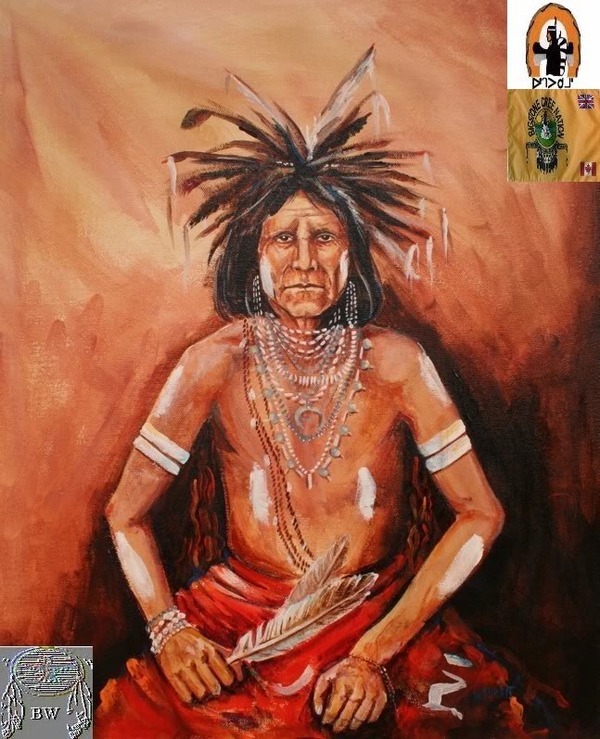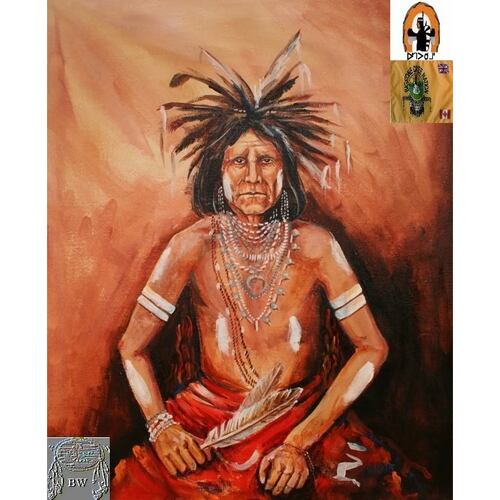
Source: Link
PASTEDECHOUAN (Patetchoanen, Ahinsistan, Atetkouanon), baptized Pierre-Antoine, Montagnais Indian, early victim of French-Indian cultural conflict; fl. 1620–36.
The life of Pastedechouan provides a tragic example of one aspect of the European impact on Indian culture. In 1620 he was taken as a child to France by the Recollets, baptized, and given the name Pierre-Antoine, with the Prince de Guémenée acting as his godfather. The latter supervised his studies for the next five years and Pastedechouan became proficient in both Latin and French.
He was persuaded to return to Canada in 1626 with the Recollet Father Joseph de La Roche Daillon, who arrived in August of that year. Pastedechouan lived for a time with the Recollets at Quebec but did not mix with the Indians, probably because he had almost forgotten his own language. He was, therefore, advised to return to his own district near Tadoussac and to live with his three brothers, Carigouan (a famous medicine-man who had great influence over him), Mestigoït, and Sasousmat, so that he might again become fluent in his native tongue.
Here he was found in 1629 by the English, who, under the command of the Kirke brothers, had come to invade Canada. At first Pastedechouan pretended that he could not understand the English who questioned him in both French and Latin but a French deserter exposed this feigned ignorance. The English held Pastedechouan as an interpreter, supplied him with goods to trade with the Indians at Trois-Rivières, and permitted him to start off alone. He did not return.
During the English occupation of Quebec, Pastedechouan turned away from Christianity and reverted to his native customs and way of life. In 1632, after the French regained New France, Pastedechouan visited Émery de Caën, who employed him as an interpreter but later dismissed him as unreliable. On 13 Nov. 1632, Pastedechouan, who was now incapable of maintaining himself by hunting, took up residence with the Jesuit fathers at Quebec, where he was to teach Father Paul Le Jeune the Montagnais language. He refused, however, to continue with his lessons after Easter 1633 and rejoined his brothers. Le Jeune, anxious to master the language and to commence his missionary work, joined them in a hunting expedition. Pastedechouan, crazed by drink and completely under the domination of Carigouan (who hated the priest), proved of no help to Le Jeune during this winter of near starvation in the forests. He did, however, accompany his brother Mestigoït, who paddled Le Jeune to safety at Quebec through the early spring break-up of the frozen St. Lawrence.
Pastedechouan married a daughter of Manitougatche, who left him, whereupon he took a wife from another nation. He is said to have had four or five wives in all. Before he died the women ridiculed him. In 1636 he died of starvation, alone in the woods.
Du Creux, History (Conacher), I, 140, 141, 156. JR (Thwaites), V, 107–11; VI, 87; VII, 69, 173; IX, 69–71. Le Clercq, First establishment of the faith (Shea), I, 235–37, 273–74, 295–96. Sagard, Histoire du Canada (Tross), III, 785–87.
Cite This Article
Thomas Grassmann, “PASTEDECHOUAN (Patetchoanen, Ahinsistan, Atetkouanon), baptized Pierre-Antoine,” in Dictionary of Canadian Biography, vol. 1, University of Toronto/Université Laval, 2003–, accessed December 24, 2025, https://www.biographi.ca/en/bio/pastedechouan_1E.html.
The citation above shows the format for footnotes and endnotes according to the Chicago manual of style (16th edition). Information to be used in other citation formats:
| Permalink: | https://www.biographi.ca/en/bio/pastedechouan_1E.html |
| Author of Article: | Thomas Grassmann |
| Title of Article: | PASTEDECHOUAN (Patetchoanen, Ahinsistan, Atetkouanon), baptized Pierre-Antoine |
| Publication Name: | Dictionary of Canadian Biography, vol. 1 |
| Publisher: | University of Toronto/Université Laval |
| Year of publication: | 1966 |
| Year of revision: | 1979 |
| Access Date: | December 24, 2025 |



